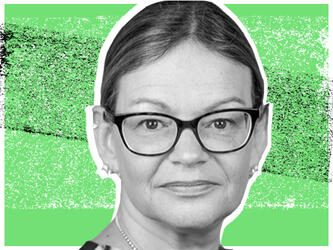Next generation chat with Jigna Tailor: ‘A little courtesy goes a long way’

What is your average day like?
The average day starts with checking my inbox to see if there are any updates on current projects. We will then have a quick team meeting to catch up with each other if we are not in the office, and it is lovely to have a team culture where time and space is provided for bonding with your team. The morning might then be spent on drafting a survey for a new client brief that has come in and sending the questions off to be scripted by our partner agency.
When I am in the office, I will make sure to take my lunch with my team and we often wind up talking about one of my favourite topics – food. After lunch, the afternoon may focus on catching up with other projects. After work, there is sometimes a social and those are always a great way to meet new people and learn more about how different teams at Dunnhumby work.
How did you find working client-side?
I had only previously worked client-side as a researcher before moving to Dunnhumby this year. [In my previous role] I learned that different personalities suit different kinds of roles. If you like a faster-paced role with more pressure, lots of variety and breadth, and if you like talking to lots of different clients and travelling around, then an agency role might be more suited for you. But if you’d like to be a specialist in one industry, build in-depth relationships with one set of stakeholders and also be involved in mixed methodologies, then client-side could be the way to go.
I think being open-minded to both sides is best, as both offer different things and you never know what you might find. Personally, I found client-side very fulfilling. I do like being an in-depth specialist – once I get in the zone, I want to know everything there is to know about that one topic or subject.
How was your experience of redundancy?
I actually found the prospect of finding a new role and starting afresh quite exciting. As long as you are not struggling financially, it is a good opportunity to take some time to see what’s out there and reflect on what you want for your next role.
It was also a positive experience in a networking sense – once I went public that I was looking for a new role, the support from my network through LinkedIn was genuinely uplifting, and it gave me the opportunity to connect with several individuals within the sector who I might not have otherwise. I found a mentor through MRS’s mentorship programme, and they were very generous with their time, reviewing my CV and putting me in touch with several people in their network.
Is there any advice you would give to early-career researchers?
As someone who was made redundant but found an overwhelming level of support, I’d say networking is key. Nearly everyone is on LinkedIn, but I don’t think that’s enough on its own. Put yourself out there, attend events and get in front of the right people.
Also, lead with kindness and courtesy – networking isn’t just about utilising contacts to get ahead in your career, but is a two-way relationship. It often starts with you thinking about what you can offer of value as well, from support and engagement on other people’s LinkedIn posts through to sharing your tips and what you’ve learned with others and share best practice.
Personally, I find it a bit hit-and-miss on LinkedIn with people responding to you, but what is in my control is always being courteous and always responding to those who reach out to me. I make it a habit to follow up with anyone I’ve spoken to at a physical event on LinkedIn. A little courtesy goes a long way.
What three words would you use to describe yourself?
Curious, adaptable and efficient. Being curious and efficient has been my trademark in my last few roles.
What would you tell your younger self?
It’s OK to make mistakes – don’t be afraid of failure, it’s where the best lessons come from. I used to put a lot of pressure on myself to get things right the first time around, but over time I have realised the growth comes from learning, adapting and showing up consistently.
Is there any advice you’d share with those looking to break into research?
If you’re looking to break into research but work in a different sector or role at the moment, my advice would be to embrace the research part of your role. Most roles have a research element, especially if you’re already in an adjacent role, like I was in sales and marketing. Think about what research you might already be doing in your role so you can focus on improving those research skills and getting insights onto your CV to position you for those future roles.
What advice would you offer others looking to get involved in mentoring?
The mentorship scheme fits in with one of my key themes – networking – in terms of being able to find someone who is already in the industry and is skilled, experienced and has things to share with you that can serve as lessons and help you in your own career. As a mentee, I think it has been invaluable.
Personally, I wasn’t new to working but I was new to research – I had already had a fulfilling career in marketing. It was more soft skills I needed; I wanted to benchmark what I was doing within research and insight, especially being client-side. Sometimes client-side can be a bit lonelier than working in an agency because you might be the only person doing insight. Having a mentor is very nice in that respect, as you have someone to bounce ideas off and get advice on any challenges you might be having at the time.
If you have the opportunity for mentoring, take it, especially early career, as it is very useful to get to know people, get their advice and help you develop.
How do you feel about AI?
I see AI as an incredibly intelligent intern. It is fast, it is capable, it is eager to help, but it still needs supervision. It can help free up strategic thinking time, but just like an intern, you need to double check its work and provide the human context and nuance it lacks. AI, for me, is a tool that amplifies our work and does not replace the critical thinking and empathy that only people and researchers can bring. It is a tool, not a replacement.
Do you think the industry is at a turning point?
Having been to many of the industry events, and networking with individuals in the sector, I find there is a reluctance to try something new. But with more data than ever, more technology than ever, and with a need to deliver insights faster than ever, I believe AI can help with this. So, while there are some embracing AI, I would advise everyone in the sector to give it a proper go and realise it is not there to replace what you do but to help you become more efficient.
- More information on the MRS mentoring scheme can be found here.

We hope you enjoyed this article.
Research Live is published by MRS.
The Market Research Society (MRS) exists to promote and protect the research sector, showcasing how research delivers impact for businesses and government.
Members of MRS enjoy many benefits including tailoured policy guidance, discounts on training and conferences, and access to member-only content.
For example, there's an archive of winning case studies from over a decade of MRS Awards.
Find out more about the benefits of joining MRS here.












0 Comments